新概念第二册第3和4课PPT课件
新概念英语2册第4课ppt精校版课件
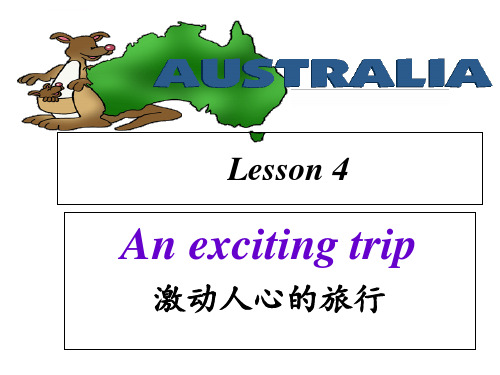
寒假来临,不少的高中毕业生和大学 在校生 都选择 去打工 。准备 过一个 充实而 有意义 的寒假 。但是 ,目前 社会上 寒假招 工的陷 阱很多
★ receive
v. 接受,收到
• 收到某人来信 • receive from sb.
=hear from sb. 收到~~的来信
寒假来临,不少的高中毕业生和大学 在校生 都选择 去打工 。准备 过一个 充实而 有意义 的寒假 。但是 ,目前 社会上 寒假招 工的陷 阱很多
3.He is working for a big firm and he has already visited a great number of
different places in Australia.
寒假来临,不少的高中毕业生和大学 在校生 都选择 去打工 。准备 过一个 充实而 有意义 的寒假 。但是 ,目前 社会上 寒假招 工的陷 阱很多
2. V+宾语+宾补 Find + n. + adj. 发现教室很干净 find the room clean make + n. + adj 让学生们开心 make the students happy
寒假来临,不少的高中毕业生和大学 在校生 都选择 去打工 。准备 过一个 充实而 有意义 的寒假 。但是 ,目前 社会上 寒假招 工的陷 阱很多
★ different
adj.
不同的
1. 与……不同
be different from 这个电脑和那个不同。 This computer is different from that one. • 反义词: 与……相同 the same …as 这个电脑和那个电脑相同。 This computer is the same as that one.
新概念第二册第3课(共26张PPT)

• 双宾语:直接宾语(动作结果)和间接宾语(动作 目标)
• give sb. sth.= give sth. to sb.
• sth. 直接宾语
sb. 间接宾语
• 间接宾语在后时,其前须加 to(“给”)or for (“为”)
• 与 to相连的:lend 、send、teach... ... • 与for相连的:buy、order、make、find... ...
• Lesson 3
• Please send me a card
1
Discussion
• 1 How did you spend your holidays this year?
• 2 Where did you go and what did you do?
2
New words and expressions
• 1 send [send]
v.寄,送
• 2 postcard ['pəustkɑ:d] n.明信片
• 3 spoil [spɔil]
v.使索然无味,损坏
• 4 museum [mju:'ziəm] n.博物馆
• 5 public ['pʌblik] a.公共的
3
• 6 friendly ['frendli] a.友好的
• 宠坏 eg:His parents spoiled the boy.
• 毁了…心情 eg:This spoiled my day
•
• Spare the rod and spoil the child
•
惜了棍棒害了儿女
•
6
• ★museum n. 博物馆 • Palace Museum 故宫博物院
新概念英语第二册第三课讲解

Lesson 3 Please send me a card请给我寄一张明信片Postcards always spoil my holidays. Last summer, I went to Italy. I visited museums and sat in public gardens. A friendly waiter taught me a few words of Italian. Then he lent me a book. I read a few lines, but I did not understand a word. Everyday I thought about postcards. My holidays passed quickly, but I did not send cards to my friends. On the last day I made a big decision. I got up early and bought thirty-seven cards. I spent the whole day in my room, but I did not write a single card!New words and expressions 生词和短语send v. 寄,送 postcard n. 明信片 spoil v. 使索然无味,损坏museum n. 博物馆public adj. 公共的friendly adj. 友好的waiter n. 服务员,招待员lend v. 借给decision n. 决定whole adj. 整个的single adj. 唯一的,单一的参考译文明信片总搅得我假日不得安宁。
去年夏天,我去了意大利。
我参观了博物馆,还去了公园。
一位好客的服务员教了我几句意大利语,之后还借给我一本书。
我读了几行,但一个字也不懂。
新概念第二册第4课课件
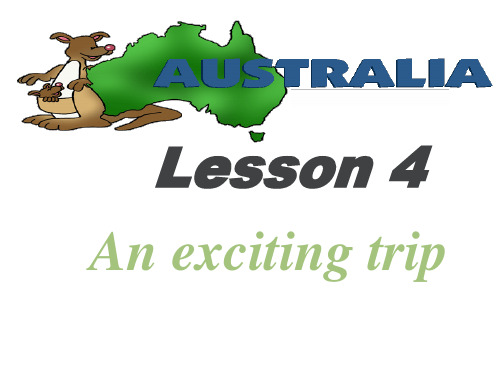
Most backpackers prefer to travel on their own to enjoy his or her solitary life.
You can also travel with your true friends.
Self-driving travel is another good choice.
Oh, no views but crowds in their photos
You must buy something.
You are often forced to buy things while taking group travel. What’s worse, the souvenirs you bought may be the products of poor qualities.
Honeymoon travel
How romantic!
Do careful preparations
Tour route Weather Time plan Map Hotel Possible expenses Cultures security ……
Today we’ll listen to a story about a trip to
Lesson 4
An exciting trip
kangaroo pouch
koala
Group 1 the most common reasons for traveling
Group 3 the different means of transportation in travelling
Let’s go travelling
新概念第二册第3课PPT
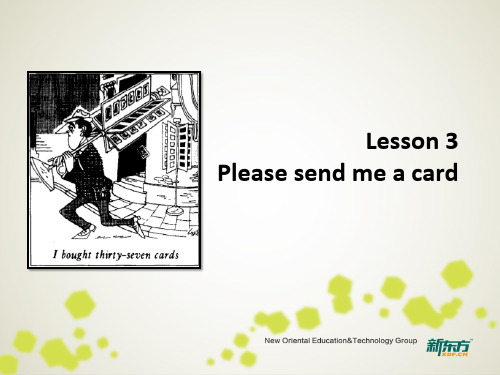
北京新东方初中新概念
Understand the situation
T: What do you think is happening in the picture?
北京新东方初中新概念
The beautiful park is spoilt by litter _____________.
北京新东方初中新概念
___________ Homework will spoil our holidays.
北京新东方初中新概念
Study without desire spoils the memory, and it retains nothing that it takes in. -- Leonardo da Vinci
北京新东方初中新概念
send v.
to arrange for something to go or be taken to another place, especially by post 发送
北京新东方初中新概念
send sent sent
北京新东方初中新概念
I sent my mother some flowers. I sent some flowers to my mother.
北京新东方初中新概念
I will never lend _________________ my underpants to others.
北京新东方初中新概念
I will lend _____________ my dog my underpants.
新概念英语第二册第4课课件(共22张PPT)

课文链接(1)
课文链接(2)
课文链接(3)
课文链接(4)
课文链接(5)
Grammar(语法1):现在完成时
Grammar(语法2) 现在完成时
Summary writing.(摘要写作1)
1)What has the writer just received from his brother , Tim? The writer has just received a letter from his brother, Tim. 2)Is Tim an engineer, or is he a doctor? Tim is an engineer. 3)How long has he been in Australia? He has been in Australia for six months. 4)Has he already visited many places or not? Yes, he has already visited a great number of places. 5)Where is he now? He is in the small town Alice Springs in the centre of Australia. 6)Has Tim ever been abroad before or not ? No, he hasn’t been abroad before. 7)Is he enjoying his trip very much or not? Yes, he is enjoying his trip very much.
Read the text !
I have just received a letter from my brother,Tim. He is in Australia. He has been there for six months. Tim is an engineer. He is working for a big firm and he has already visited a great number of different places in Australia. He has just bought an Australian car and has gone to Alice Springs, a small town in the centre of Australia. He will soon visit Darwin. From there , he will fly to Perth. My brother has never been abroad before, so he is finding this trip very exciting.
新概念英语第二册第3课教学课件

• 用lend和borrow填空
• 1. She ____ a book to me last week. • 2. She ________ a book from the library yesterday. • 3. Don’t _______ money from me. I have no money with me. • 4. I will ______ you some money, but please return it to me
• She made me a breakfast. • She made a breakfast for me.
• She showed her friends her new dress. • She showed her new dress to her friends.
一般过去时表示过去发生,现在已结束的事、动作或情况。 一般过去时常指动作何时发生,不指动作持续多久。
• D.特殊疑问句 疑问词(不作主语)+was/were+主语+其他?
•
疑问词(作主语)+was/were+其他?
•
疑问词+did+主语+动词原形+其他?
3.表示过去的时间状语
• a moment ago, yesterday morning, last night,the day before yesterday
• 6. He gave his homework to the teacher. But there is not as_in_g_l_e___ word in it. • 7. We are going to visit the m__u_s_e_u_m__ next week. We can learn a lot there. • 8. He did his homework in his bedroom thew_h_o_l_e___ morning. • 9. If you give everything the child wants, you’ll _s_p_o_il____ him. • 10. Don’t be so rude. You should be _f_r_ie_n_d_ly___ to your neighbors. • 11. My friend _se_n_t___ me a p_o_s_t_c_ar_d____ last week from abroad.
新概念英语第二册第4课

• exciting adj. 令人兴奋的 excited adj. 兴奋的 -ed: 自己感到(修饰人) / -ing:令人感到(修饰物) It's an exciting story. Everybody feels excited about it. an exciting trip 激动人心的旅行 an exciting news 振奋人心的消息 interesting adj. 令人感到有趣的; interested adj. 感到有意思的
也可表示持续到现在的动作或状态。 He has learned English since 2001.
--从2001年开始学的,现在还在继续学着呢
sum up
一、现在完成时
1)构成 肯定句:主语+have/has+过去分词+其它 He has been to Australia. 否定句:主语+have/has not+过去分词+其它 He has not been to Australia. 疑问句:Have/Has+主语+过去分词+其它
Language points
1. I have just received a letter from my brother. 收到某人来信
get a letter from sb.
have a letter from sb.
hear from sb. 2.He is working for a big firm.
Summary writing
The writer has just received a letter from his brother, Tim. Tim is an engineer. He has been in Australia for six months. He has already visited many places. Now he is in Alice Springs. Tim has never been abroad before. He is enjoying his trip very much.
新概念英语第二册第四课全课课件

n. 商行,公司
adj. 不同的
centre /'sentə/
abroad /ə'brɔːd/
n. 中心
adv. 在国外
DR
First listen and then answer the question. 听录音,然后回答以下问题。
1. How long has Tim been in Australia? Tim has been in Australia for six months. 2. What does he do in Australia?
常与_______、_____、(only) once、_____或three times等连用,可以 用________________提问,谓语:________v.;
e.g. ① I have already finished my lunch. 我已经吃过午饭了。 ② He has never been late for school. 他上学从未迟到过。
— I have lived here for about ten years. 我在这里住了大约十年了。
DR
21
c. 特别注意:
1. have gone to ( )& have been to( ) e.g. ① It can’t be John. He has gone to town. 那不可能是约翰,他进城了。 ② John knows the way well. He has been to the city before. 约翰很熟悉那里的路。他以前去过那个城市。
3. Why is Tim finding the trip exciting?
DR
新概念英语第二册Lesson4课件
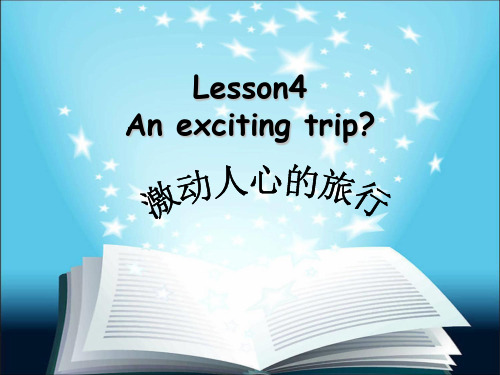
New words
firm n.商行,公司 law firm法律公司
公司
=company
different adj.不同的—— same相同的
adv. differently, n. difference
e.g. My coat is different from yours.
和…相同,一样
be the same with/as
--他们已经离开了,也就是说现在他们人不在这里
I have had my lunch.
--我已经吃过午饭了,也就是说我现在不饿
也可表示持续到现在的动作或状态。
He has learned English since 2001.
现在完成时与一般过去时的比较
1)一般过去时表示过去某时发生的动作或 单纯叙述过去的事情,强调动作;
yesterday.
6. There ___w_a__s(be) a telephone call for you just now. 7. When _d_i_d___ you _c_o__m__e(come) to China?
----Last year.
8. Yesterday I _t_h_o_u__g_h__t (think) that you were not in
现在完成时为过去发生的,强调过去的 事情对现在的影响,强调的是影响。
I saw this film yesterday. (强调看的动作发生过了。) I have seen this film. (强调对现在的影响,电影的内容已经知道 了。)
Grammar
2一般过去时常与具体的表示过去的时间状语连用; 现在完成时通常与模糊时间状语连用或无时间状语。
新概念英语第二册课件 Lesson 3
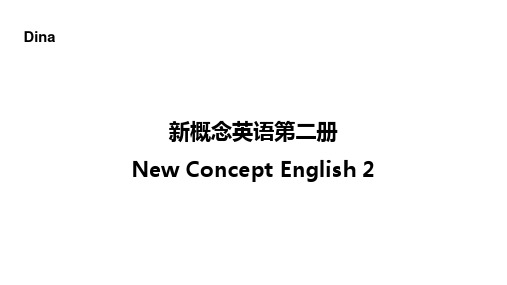
Dina
New Words and Expressions
museum [mju:'ziəm] n. 博物馆
Palace Museum 故宫
public ['pʌblik] adj.公共的;公立的,公营的
① 公共的 public places 公共场所 ② 公开的 public letters 公开信 in public 公开 ③ 公立的 public school 公立学校 ④ n. 公众 The museum is open to the public on Sundays.
lend-lent-lent lend sb. sth.= lend sth. to sb.
borrow (借入) borrow sth. from sb.
Dina
New Words and Expressions
decision [di'siʒən] n.决定
decide v.决定 make/arrive at/reach/come to a decision 做一个决定 make/arrive at/reach/come to a decision to do sth. 决定做某事 =decide to do sth.
A friendly waiter taught me a few words of Italian.
teach ①teach sb. sth.=teach sth. to sb. ② teach sb. to do sth . word have a word with sb.与某人聊几句 have words with sb. 与某人吵架
whole [həul] adj.整个的
as a whole总体上 on the whole 总的来说
新概念第二册第3课

•5. decision n. 决定 decide v. • make / take a decision作出决定 •eg. It was not easy for me to make this decision.
On the last day I made a big decision.
• Make a decision 做决定
• 下定决心 • Make up one’s mind to do sth. • 决定做某事 • Decide to do sth.
• Single 单一的,单身的
Eg. 单程票:A single ticket. • 单身汉: a single man
• name card /visiting card 名片
• eg. Here is my name card. • ID card 身份证 • credit card 信用卡 • cash card 现金卡, 储蓄卡, 工资卡
• 3.spoil (spoiled,spoilt) vt. • (1)弄坏,损坏,糟蹋 • eg. The sad news spoiled our weekend. • The rain spoiled the school sports. • (2)宠坏,惯坏,溺爱 • eg. Julie loves her son too much. She
has spoiled him. • Don't spoil your children.
• break: 破坏,break the windows 打破玻璃
新概念英语第二册课课件 Lesson

•A public house which was recently bought by Mr. Ian Thompson is up for sale.
•a public house 酒吧、酒店,口语缩略为pub •up for sale 有待出售,供出售 •be up for 有待于…,为了某一目的 •This problem is up for discussion. •这个问题有待于讨论。 •on sale 打折卖 for sale 待售;出售
• ★shake(shook,shaken) v. 摇动 • vt.&vi. 摇,摇动,抖动 • Mr. Thompson shook his head. • His hands appear to be shaking. • 他的手看上去在发抖。 • ② vt. 同…握手 • Dan shook hands with him.
A public house which was recently bought by Mr. Ian Thompson is up for sale. Mr.Thompson is going to sell coming from the bar. The next morning, he found that the doors had been blocked by chairs and the furniture had been moved. Though Mr.Thompson had turned the lights off before he went to bed, they were on in the morning.He also said that he had found five empty whisky bottles which the ghost must have drunk the night before. When I suggested that some villagers must have come in for a free drink, Mr.Thompson shook his head. The villagers have told him that they will not accept the pub even if he gives it away.
新概念第二册第3课精品课件
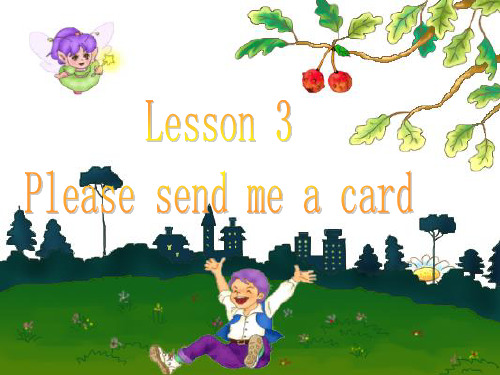
课文讲解
• Postcards always spoil my holidays. Last summer, I went to Italy. I visited museums and sat in public gardens. A friendly waiter taught me a few words of Italian. Then he lent me a book. I read a few lines, but I did not understand a word. Everyday I thought about postcards. My holidays passed quickly, but I did not send cards to my friends. On the last day I made a big decision. I got up early and bought thirty-seven cards. I spent the whole day in my room, but I did not write a single card!
★friendly adj. 友好的 • friendly是形容词,单独使用时一般做定语 • She gave me a friendly greeting. • 她友好的向我问好。 • 他对约翰不友好。 • He is not very friendly to John. • in a friendly way作为状语表示这个人做什么事 情很友好, 用短语 • 他总是友好的向我问好。 • He always greets me in a friendly way.
★send v. 寄, 送 • 寄信 • send a letter • send sth. to sb. /send sb. sth. • 给某人送(寄)什么东西 • send是通过第三人去送 • take强调某人亲自送 • take flowers to his wife • send flowers to his wife
- 1、下载文档前请自行甄别文档内容的完整性,平台不提供额外的编辑、内容补充、找答案等附加服务。
- 2、"仅部分预览"的文档,不可在线预览部分如存在完整性等问题,可反馈申请退款(可完整预览的文档不适用该条件!)。
- 3、如文档侵犯您的权益,请联系客服反馈,我们会尽快为您处理(人工客服工作时间:9:00-18:30)。
2. What did he do during the holiday? 3. Did he have a good time? 4. Why didn’t he enjoy his holidays? 5. What did he do on the last day of his
They paid a visit to the old factory.
public gardens; public place public letters
4. friendly: adj. 友好的
a friendly person He’s not very friendly to/towards newcom 3. until 4. outside 2.5. ring rang rung 6. aunt 7. repeat 3.8.private 9. conversation 10. seat 4.11. go to the theatre 12. talk loudly 5.13.get angry 14. pay attention to
between the lines:字里行间
You should read between the lines .
8. every day : 每天(作状语)
Every day he has to go to school on foot. He reads newspaper at 8:00 every day.
holidays? 6. How many cards did the writer send?
Language points
1. Send vt.
A. Did you send Susan a birthday card? = Did you send a birthday card to Susan?
The cook had spoilt the soup by putting too much salt(盐) in it.
3. visit : vt 参观
Many students go to visit the famous university every year.
visit : n 参观 pay a visit to
me 6.15. by train 16. look out of the
window
1.Do you like traveling? 2. 2. What would you like to
do on vacations ?If you have a chance to choose, What will you do?
根据中文写出相应的英文
1、忍受 2、无礼地,粗鲁地 3、直到 4、外面 5、(铃、电话等)响 (原形、过去 式和过去分词) 6、姑,姨 7、 重复 8、私人的 9、 谈话 10、 座位 11、 去剧院 12、大声交谈 13、 变得生气 14、 注意我 15、乘火车 16、 向窗外看
Sunday-never – early – Sundays – sometimes –stay in-until- lunch timelast– very late – looked – window– dark outside–!(thought)- raining – just then – rang – Aunt Lucy – arrived – train – coming to see – still – breakfast – doing? (having)-repeated – dear me – alwayslate-one o’clock
你有没有送给苏珊生日贺卡?
Send sb sth/ send sth to sb
B. She sent her daughter to buy some milk and bread. 她让女儿去买些牛奶和面包.
Send sb to do sth
2. Spoil (spoiled, spoiled 或spoilt, spoilt)
stay at home
go to the beach
go hiking
visit friends and relatives
visit museums
museum
go to New York City
What spoiled his holidays ?
Watch and Answer
make up one’s mind decide
11. the whole day:一整天
all the day .
P21 阅读对话所涉及的动词及其过去式 hit----hit run---ran try---tried come-came climb---climbed get----got begin---began
lovely (adj.) 可爱的 a lovely girl a lovely meal
5. a few words: 几句话
a man of a few words :少言寡语的男人
have a few words with sb
6. lend / borrow 7. a few lines: 几行
everyday: 每天的,形容词
everyday life 日常生活 He learnt some everyday English in those days.
9. think about: 想着
think of:想到 think over: 仔细思考 think twice:三思
10. make a(big/tough)decision : 作出(大的/艰难的)决定
Exercises P22 My friend, Roy,_d_ie_d_(die) last year. He_le_f_t _(leave) me his CD player and his collection of CDs. Roy_s_p_e_n_t _ (spend) lot of money on CDs. He_b_o_u_g_h(tbuy)one or two new CDs every week. He never_w_e_n_t__(go) to the cinema or to the theatre. He_st_a_y_ed_(stay)at home every evening and _li_s_te_n_e_d(listen)to music. He often_l_e_nt__ (lend) CDs to his friends. Sometimes they k_e_p_t__ (keep) them. He_lo_s_t_(lose) many CDs in this way.
